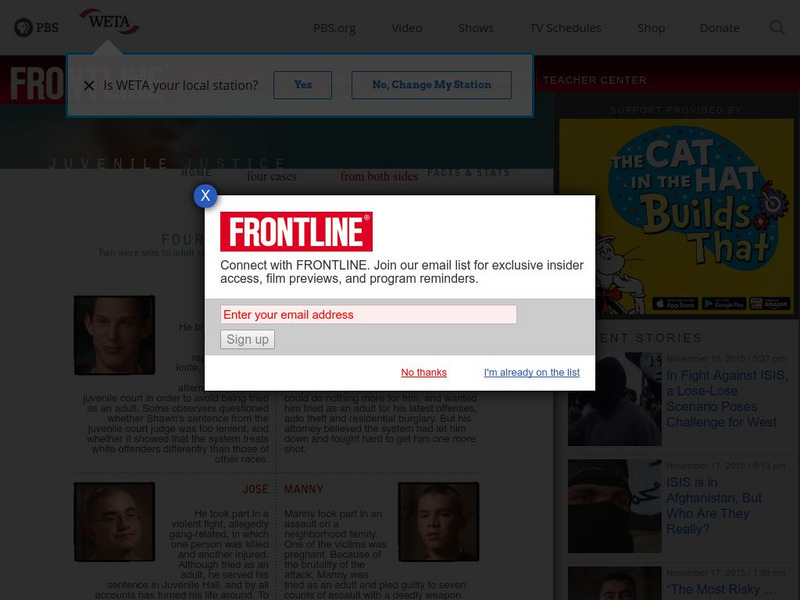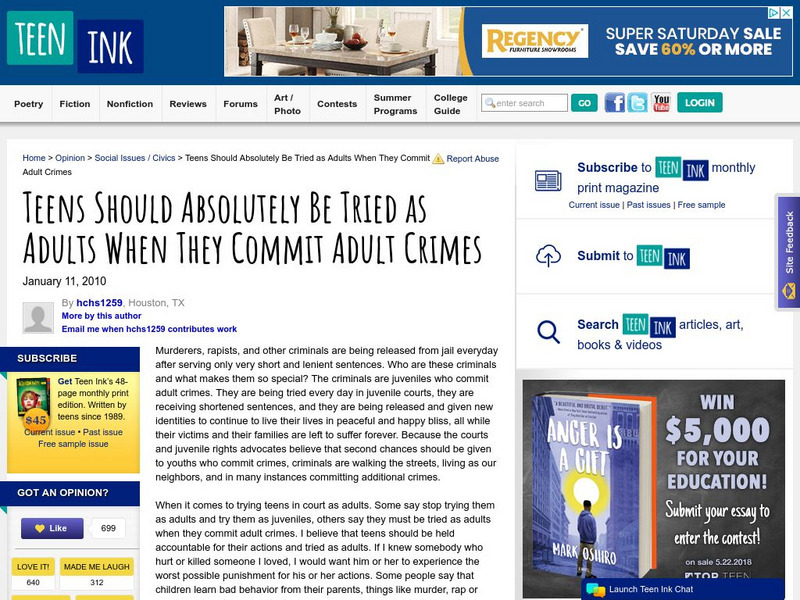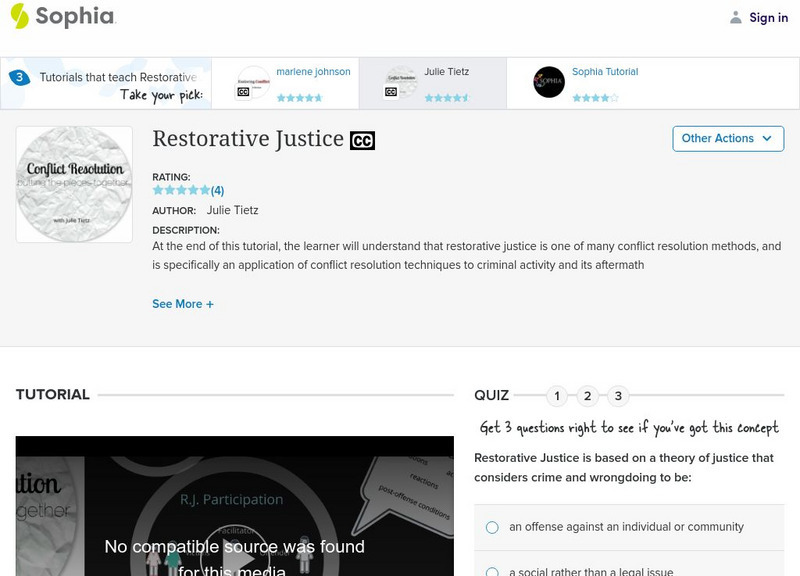Teaching Civics
Legal Ways: Extended Jurisdiction Juvenile
An amazing set of resources! Found here are several lessons that work in conjunction to help learners better understand the juvenile court system. Learners review the judicial process, discuss how juveniles are tried, and hold a class...
Curated OER
Introduction to Juvenile Delinquency
Learners discuss cases in which juveniles were convicted of horrific crimes. They answer questions in which there are no right or wrong answers related to juvenile delinquency.
PBS
Pbs: Frontline: Juvenile Justice
Read case profiles of several juvenile criminals, many who have been tried as adults. Includes personal background information on each individual, and a discussion of their sentencing.
PBS
Pbs: Frontline: Juveniles Tried as Adults: Statistics
This resource supplies statistics on court cases where juvenile offenders have been charged as adults.
Cornell University
Cornell University: Law School: In Re Gault (1967)
Presents the syllabus of the landmark Supreme Court case of In re Gault which decided that juveniles tried for crimes in delinquency proceedings should have the right of due process protected by the Fourteenth Amendment.
Other
National Crime Prevention Council: Teens, Crime, and the Community
With a section for teens and one for adults, TCC offers information and resources aimed at reducing violence in the lives of teens--with their help.
Other
Child Abuse and Neglect and Dependency Courts [Pdf]
This article provides an overview of the legislation and court decisions regarding abuse and programs meant to address juvenile delinquency issues.
Other
Teen Ink: Opinion: Teens Should Absolutely Be Tried as Adults for Adult Crimes
In this opinion piece, the teen author makes the case for minors who commit adult crimes to be tried as adults.
Arizona State University
Jiae: Indian Juvenile Delinquency So Different?
This site from Journal of American Indian Education shows the 1967 article calls for a focus on the commonality of Indian and non-Indian people, when dealing with mental health issues, rather than treating them like two different problems.
Annenberg Foundation
Annenberg Classroom: Rights of Juvenile Defendants
This website contains an interactive timeline about the history of rights of juvenile defendants in the United States.
Other
Madison: News: Stepbrother Criminal Abuser, if Not an Adult Criminal
Learn about the case of a teenager accused of sexually assaulting his stepsister, and the debate about his trial as an adult criminal three years after the crime, at the age of 20.
CNN
Cnn: Opinion: Kids Should Never Be Tried as Adults
In this editorial, the author outlines the case for why minors who commit crimes should not be tried as adults. Includes examples, including that of a 9 year old tried in the adult justice system.
CommonLit
Common Lit: "The Cost of Prison in Dollars and Lives" by Michael P. Jacobson
In this opinion piece, Michael Jacobson discusses juvenile justice and how young offenders should be treated in comparison to adult offenders. [Free account registration required for specific tools.]
PBS
Pbs Learning Media: Now: Do Now: Should Teens Who Commit Serious Crimes Be Sentenced as Adults?
Click on Watch on YouTube to watch the FRONTLINE film "Stickup Kid." Then Do Now activity, students engage in a conversation around teen sentencing and discuss the question: Should teens under 18 be tried and sentenced as children or...
Sophia Learning
Sophia: Restorative Justice: Lesson 1
At the end of this tutorial, the learner will understand that restorative justice is one of many conflict resolution methods, and is specifically an application of conflict resolution techniques to criminal activity and its aftermath. It...








![Child Abuse and Neglect and Dependency Courts [Pdf] Primary Child Abuse and Neglect and Dependency Courts [Pdf] Primary](https://d15y2dacu3jp90.cloudfront.net/images/attachment_defaults/resource/large/FPO-knovation.png)



